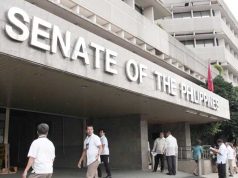Palace defends martial law after Jolo blast
MALACAÑANG ON Monday defended the continued implementation of martial law in Mindanao, in the wake of Sunday’s twin blasts at the Jolo Cathedral in the predominantly Muslim island and municipality of Jolo.
The terror attack, which followed a week after a largely peaceful plebiscite on a proposed law that would hand over political administration to rebel group Moro Islamic Liberation Front, has prompted international condemnation including by Pope Francis as well as the government to order a lockdown on the town, even amid the ongoing enforcement of martial law in Mindanao for more than two years now.
Terror incidents have been reported in Mindanao despite martial law. On the other hand, Presidential Spokesperson Salvador S. Panelo said on Monday, “If there was no martial law there, then there would have been chaos and anarchy there. You see how they were able to get Marawi? There was no martial law then.”
“One or two [bombings]. That’s little,” he also said, referring to last Sunday’s attack and the New Year’s Eve bombing of a mall in Cotabato City.
President Rodrigo R. Duterte, as of this reporting Monday night, was scheduled to fly to Jolo. “Well, of course, he was so angry, for one,” Mr. Panelo said.
Meanwhile, the Western Mindanao Command (WesMinCom) of the Armed Forces of the Philippines (AFP) said in a statement on Sunday night, “Based on the CCTV footage recovered by authorities, the Ajang-Ajang group perpetrated the said bombing incident. Ajang-Ajang is a notorious group linked to the Abu Sayyaf Group (ASG) in the province of Sulu.”
“The group has been held responsible for killings of law enforcers, particularly soldiers and policemen in Jolo. They are also blamed for other heinous crimes in the area,” WesMinCom also said.
Reports from the ground said that an Alias Kamah, a brother of a slain Abu Sayyaf leader, was a suspect in the double bombing which killed 20 government troopers and civilians and wounded 112, according to the count as of this reporting.
But the Islamic State, according to its news agency Amaq on Sunday, has also claimed responsibility for the attacks.
“That’s still a propaganda as at this time,” AFP Spokesperson BGen. Edgard A. Arevalo said in response. “They have been doing false claims in the past.”
Leaders of the Catholic Bishops’ Conference of the Philippines (CBCP) held a press conference on Monday also to speak out on the terror attacks. In a pastoral statement, they said in part: “For the past few months now, we have observed how the culture of violence has gradually prevailed in our land. The recent bombing of the cathedral of Jolo where scores of people were killed and several more were injured is a further evidence to the cycle of hate that is destroying the moral fabric of our country.”
For his part, Sulu Governor Abdusakur A. Tan II said in a statement, “There has never been an episode in the post colonial history of Sulu when wars were fought due to religious differences. Sulu can rightly claim to be the most tolerant of any Muslim-dominated provinces in the region. Neighbors before the war of the ‘70s are still good neighbors until this very day.”
Mr. Tan also asked the public to avoid “speculations and rumors” and let the authorities conduct the investigation to “bring the perpetrators of this heinous and inhuman act to account for what they did to Sulu and its people.”
Pope Francis and other world leaders have themselves condemned what the Pope described as a “terrorist attack.” Speaking in Panama during a prayer for the dead and wounded, the Pope said: “May the Lord, Prince of Peace, convert the hearts of the violent ones.” — Reports by Arjay L. Balinbin, Vince Angelo C. Ferreras, Mindanao News Bureau, and Reuters



